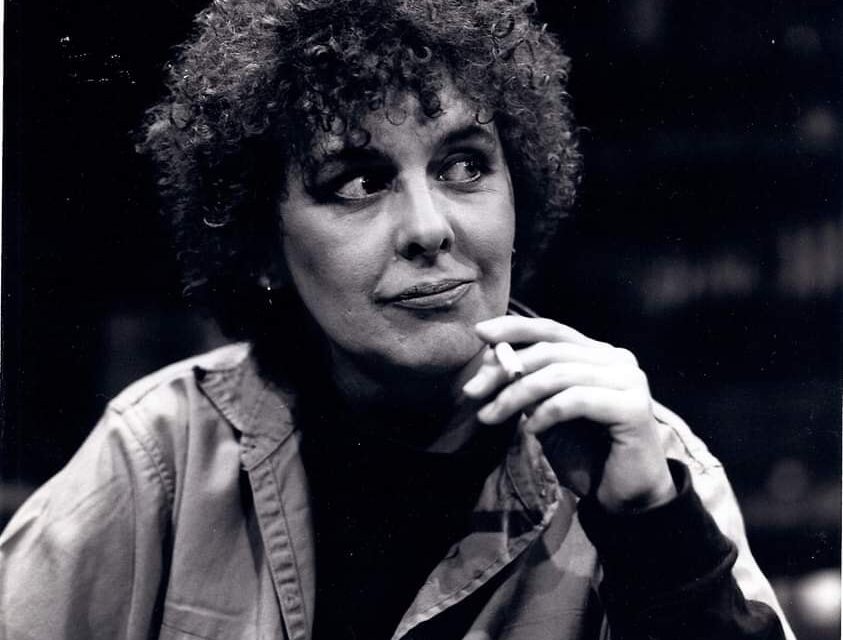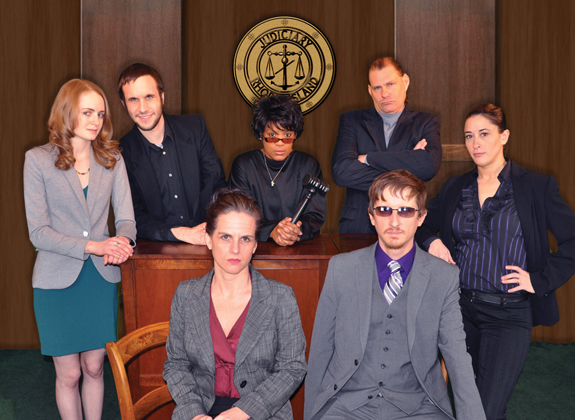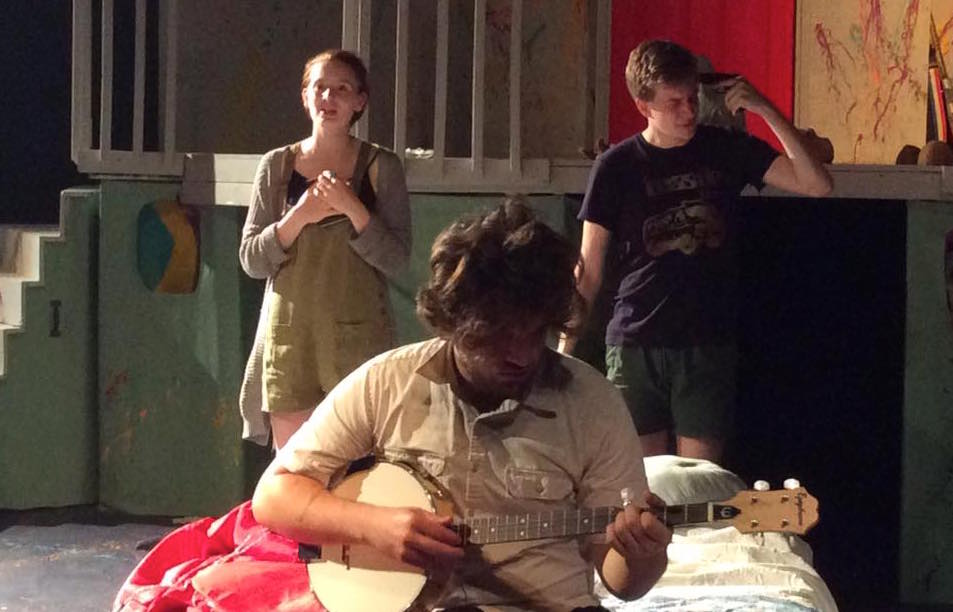A Reflection on Adale O’ Brien
By Jon Huffman
Entire contents are copyright © 2023 by Jon Huffman. All rights reserved.
I visit the LittleOldLady on Oak Street two or three times a week – I bring groceries, take out garbage, change lightbulbs, respond to panicked late-night calls: “My TV’s not working! I don’t know what to do!!”
The inside of her small Germantown home always surprises me with its darkness. She’s a proud BigSkyCountry girl who prefers darkness, even in BrightestSummer – heavy curtains shroud all the windows. Once or twice a week in good weather, she might venture onto the front porch for a few moments, but never long enough to sit in the rocking chair.
She has no real answer when I ask her, why the darkness?
“I just prefer it.”
Such pronouncements never include elaboration.
I speculate it’s how she spent her best days – in windowless rehearsal halls, then in the darker dark – backstage. When there was light, it was very bright. And it was meant to make her seen, remembered – in character and unforgettable. When she was in the light, she was someone else.
I’m part of a small but hearty band of caregivers she calls The Family, who – even after years of service – find it hard to believe that she is actually a LittleOldLady, this goddess in whose presence we all once worshipped, along with the rest of Louisville.
She has told me many times, “When I’m gone, no funeral, no memorial, no ashes spread anywhere, and no obituary!”
This is no obituary. But, for her, it is every bit as insufficient as an obituary.
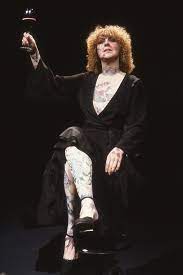
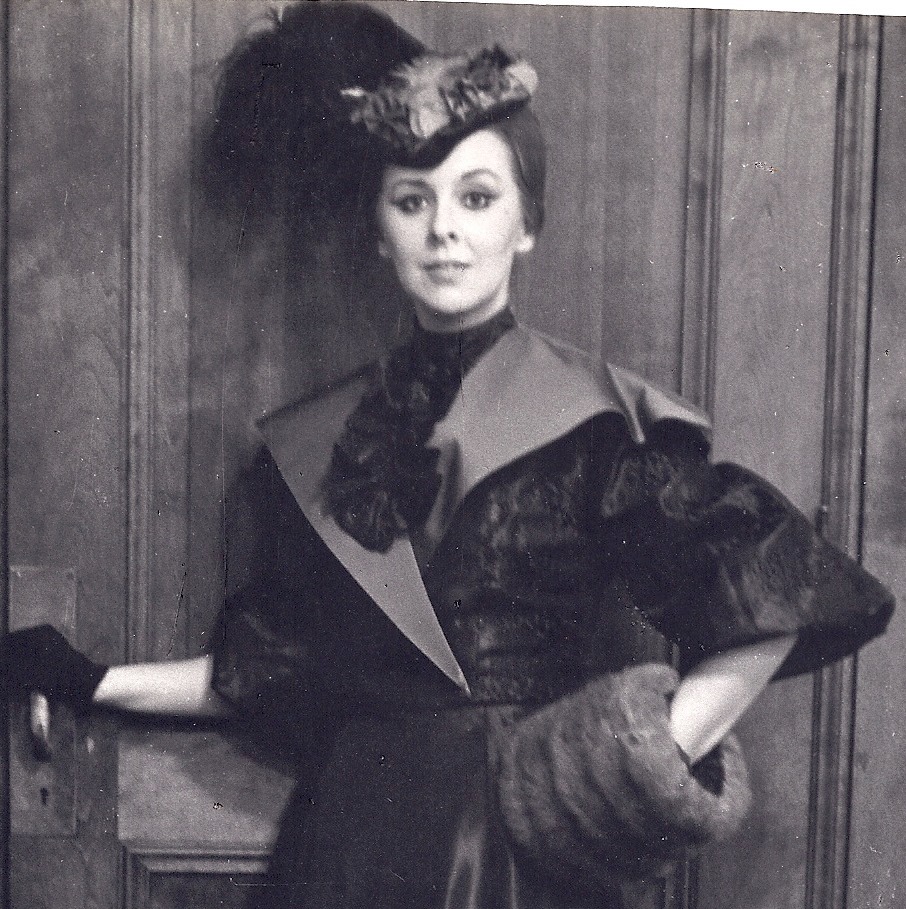
Adale O’Brien was born in June 1934, the granddaughter of pioneers who wagon-trained west from Charleston, South Carolina to Billings, Montana. Her mother insisted on the peculiar spelling of her name – Adale, not Adele – convinced that the unique pronunciation would bend each speaker’s mouth into a smile when saying her daughter’s name.
Adale was never going to be anything but an actor; from The University of Washington, she went to Vancouver as a professional. She made the usual YoungActor CoastMoves – to NYC, where her day job was as a Bunny in The Playboy Club; to L.A., where she served cocktails at dawn to travelers at LAX.
But in the country’s center, she found her stride as an actor – for a few years at The Cleveland Playhouse. Then, at the age of 35, came the move that made her career legendary.
In 1969, Actors Theatre Of Louisville’s new Artistic Director Jon Jory hired her – they were former acting colleagues – as his resident acting company’s “Leading Lady”.
The 1960s through the 1990s were the Golden Age of Regional Theatre in America. Under Jory’s leadership, Actors Theatre became one of the most important theatres in America, best known for its annual Humana Festival Of New American Plays. Theatre makers, critics, and audiences from all over the world descended on Actors each spring for the festival. Adale usually appeared in more than one play during each festival, widely solidifying her reputation as one of America’s great actors.
She could have taken advantage of such notoriety the way many actors did; she could have cashed in on her reputation and the contacts she made with industry bigwigs eager to employ her in film, TV, and Broadway.
But Adale found great comfort in doing exactly what she loved most, in the city she loved most. She had no great desire to be more “BigTime”, despite the many other Actors Theatre alumni who did, actors she knew and worked with and became close to through the years: Kathy Bates, Margo Martindale, Ken Jenkins, Chris Cooper, Laura Linney, Holly Hunter, Kevin Bacon, John Turturro, Billy Porter, and scores more of the now-famous who passed through Louisville and were dazzled by her.
Consider the life of an actor working at a regional theatre, during each “season”, roughly from August or September through April or May:
Most plays run about a month. The acting company rehearses the next show during the day, while performing the current show at night, six days a week. Monday is the only day off for most theatre companies, the day when actors must take care of all their normal adult duties – bills, laundry, grocery shopping, doctor and dentist visits, car repairs, etc. Thanksgiving is a work day. So are Christmas Eve, New Year’s Eve, Easter, and every birthday of every actor and their family members. Weddings, funerals, graduations that don’t happen on Monday – all workdays.
On the other hand, most actors – even stars – rarely know what, when, or where their next job will be. But a company member at a regional theatre might work for years with no fear of unemployment.
This was Adale O’Brien’s life for 36 years at Actors Theatre.
There were men, to be sure – she loved men – dynamic, artistic, as fiery as she, and in her later years, Adale was still in love with all of them. But her soulmate was her job; and there was never a thought about raising a family, not with the schedule her true love demanded.
The moment I actually meet her is like a movie. On a rehearsal break, way back in the day, she walks up to me and asks me for a light for her cigarette. I flick my Zippo. She stares straight into my eyes, her hand like a whisper on mine, guiding the flame gently toward her mouth.
“Thank you, Darling,” she says and turns away, her eyes, nonchalant, holding mine until the last second.
I’m smitten, I’m frozen, I’m scared to death – a young actorling in the presence of such confident, powerful sensuality. Later, I realize it’s not seduction – it’s an assertion, a benevolent Queen welcoming a new subject into her domain. Such assertion – the ability to be memorable (and it’s a moment I will never forget) – is a trademark of hers, until the end.
And later, watching her work, both in rehearsal and performance…
I’ve always been an actor who finds his performance in fits and starts throughout the rehearsal process. But, in the few shows we perform in together, I watch her characters ooze smoothly to life, like lava – a little clearer, a little more defined, a little more dangerous each day, a steady flow straight to Opening Night.
Until then, I’ve been a cocky young bastard, convinced of my future stardom. Watching her work makes me feel like a hopeless, rank amateur. But what a teacher, to learn from!
The following happens to me several times, between the late ‘80s and the late ‘90s: I’m working as an actor in Los Angeles, on a film or TV set, chatting with The Star between shots.
Star: Where are you from?
(Because nobody’s from LA)
Me: Louisville, Kentucky is home.
Star (perking up): Have you worked at Actors Theatre?
Me: Yep.
Star (suddenly excited): Have you worked with Adale O’Brien?
Me: Yep.
For the rest of my time, on-set – each time – I’m treated with the kind of respect reserved for someone who’s proven himself worthy of working with Stars.
In 2005, Adale O’Brien reached a milestone at Actors Theatre that satisfied her OCD: 222 roles played on the three Actors stages, alone, not to mention all the other roles and all the other theatres where she worked – so she retired, and, as was her way, she never looked back.
It would be silly to publish a list of roles she played – there were too many. A partial list exists here: https://www.abouttheartists.com/artists/342190-adale-obrien
When she applied for her Actors Equity Association pension, the union informed her that she had been the most prolific actor in its more than 100-year history. She was never quite as impressed by that as everyone else.
When I visit with her on Oak Street, we talk theatre for hours and hours, over the years. We talk the way actors do – not acting theories, not comparing plays, tactics, or strategies for cracking a character. We talk about the people, the dirt, the gossip, the “showmances”, the secrets she learned about “stars” before they were “stars”, the mistakes made and entrances missed, and the accidents and the idiots who call themselves directors or producers (none of whom, I am certain, are reading this piece).
I sense she misses it. But she never hesitates, “Nah! It was time to go.” I’m not so sure…
It’s hard to believe that the LittleOldLady on Oak Street doesn’t miss the applause and the adoration. She has been feted by the movers and shakers of Louisville society, invited to the best parties (but, of course, she’s always performing “that night”), treated like a diva, loved by men near and far (“my Frenchman”, “my Russian”) and admired across the country.
She has re-lived much of her life in a manuscript memoir she’s written – it runs, she says, “About a thousand pages.” (The manuscript resides at the Filson Historical Society.)
In her 89th year, when it’s time for her to consider moving to an assisted living residence, I am designated by The Family to broach the subject. I am the only male Family member, and Adale listens to me without the automatic resistance she offers the others when such suggestions are made.
I speculate that it’s because she spent her best days, in those windowless rehearsal halls, being directed by (mostly) men.
When she agrees, finally, to move, The Family holds its collective breath. Will this LittleOldLady, who’s been a semi-recluse for years, adapt to…company?
On her first day at her new home, she introduces herself to a group at the breakfast table, and another woman stares at her in wonder: “I’ve seen everything you’ve ever done!”
That’s all it takes – the spotlight hits The LittleOldLady from Oak Street, and she’s Adale O’Brien, once more.
And one day I visit her and she’s healthy and happy and witty and engaging. And the next day, she’s undergoing an emergency 11-hour surgery for multiple serious issues. The Family knows she will never recover: Pain is her Kryptonite.
Five days in, her surgeon and his coterie visit her hospital room; he wakes her and offers a long description of the craftsmanship – involving multiple incisions – he practiced on her 88-year-old body. He opines that, though she faces a long rehabilitation, she should recover completely.
Per protocol, the surgeon asks Adale if she has any questions for him. It’s also her cue to thank him for his heroic efforts.
But she knows, she’ll never leave this room. She knows the surgeon’s talent – and he did a technically amazing job – has ultimately condemned her to a far too drawn-out final scene.
So, despite the tubes, the IVs, and all the drugs meant to keep her down, she rallies in her hospital bed to answer his rosy outlook; The Actor makes her entrance, takes center stage, seizes her moment, and addresses the room:
“Go fuck yourself.”
There, I’m sure she thinks – this audience, small as it is, will always remember Adale O’Brien.
*****
Jon Huffman is a Louisville-based actor, director, and writer. He has worked with Kentucky Shakespeare, Actors Theatre of Louisville, Stage One Family Theatre, and other local companies.

